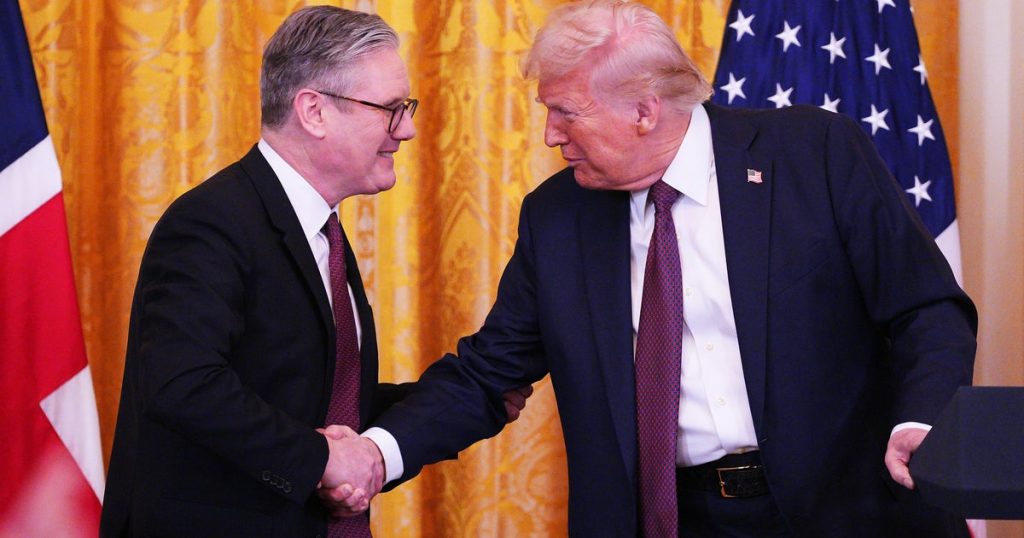On Thursday, the stock markets experienced a notable surge following the announcement of a new trade agreement between the United States and the United Kingdom by President Trump. This agreement aims to enhance market access for American exports, particularly in agriculture. While the trade deal has brought optimism, analysts caution that economic volatility may persist as the U.S. navigates its broader international trade relations.
| Article Subheadings |
|---|
| 1) Stock Market Reactions to Trade Announcement |
| 2) Key Details of the U.S.-U.K. Trade Deal |
| 3) Analysts Predict Future Market Volatility |
| 4) The Impact of Trade Relations with China |
| 5) Federal Reserve’s Stance on Interest Rates |
Stock Market Reactions to Trade Announcement
The stock market reacted positively to President Trump’s announcement, with the S&P 500 rising by 55 points (1%) to reach 5,686, while the Dow Jones Industrial Average increased by 408 points (1%) to stand at 41,523. The Nasdaq Composite saw a gain of approximately 1.3%. Market analysts noted that the positive reaction reflected investor optimism regarding the prospective economic benefits associated with the new trade agreement. However, some experts advised caution, as trade relations remain complex and multifaceted, with various factors influencing market stability.
Key Details of the U.S.-U.K. Trade Deal
President Trump unveiled the new trade agreement during an early-morning address from the Oval Office. He emphasized that the deal would bring “billions of dollars in added market access for American exports,” especially in the agricultural sector. The agreement is designed to eliminate non-tariff barriers that have previously “unfairly discriminated against American products,” according to Trump. However, it is important to note that a 10% import tax imposed on goods from the U.K. and other countries will remain in effect. This tax, originally introduced by the Trump administration in April, is expected to generate substantial revenue for the U.S.—estimated to be around $6 billion, as confirmed by Commerce Secretary Howard Lutnick during a White House briefing.
Analysts Predict Future Market Volatility
Although Thursday’s announcement provided a short-term boost to market confidence, analysts believe that more volatility may lie ahead. Solita Marcelli, Chief Investment Officer for the Americas at UBS Global Wealth Management, expressed that while there is hope for additional trade deals before the 90-day pause period ends in July, investors should prepare for fluctuations in market performance. She underscored the importance of the burgeoning artificial intelligence trend but cautioned against overconfidence in stable returns. Earlier this week, Treasury Secretary Scott Bessent indicated that the U.S. is in negotiations with 17 important trading partners, enhancing the likelihood of both opportunities and challenges as various deals unfold.
The Impact of Trade Relations with China
While the U.S.-U.K. trade agreement is seen as a positive development, larger trading partners like China present significant challenges. On the same day as the trade announcement, China reiterated its call for the U.S. to withdraw its tariffs ahead of important discussions scheduled between U.S. Treasury Secretary Scott Bessent and a high-level delegation from China. President Trump made it clear that he would not lessen the 145% tariffs placed on Chinese goods as a precondition for negotiations. In a press briefing, the Chinese Commerce Ministry emphasized the need for sincerity in negotiations, adding that unilateral actions by the U.S. must be rectified. This ongoing trade tension has created uncertainties that could influence investor sentiment and global market conditions.
Federal Reserve’s Stance on Interest Rates
Compounding the uncertainties surrounding trade relations, the Federal Reserve announced its decision to maintain the current benchmark interest rate range of 4.25% to 4.5%. This decision reflects the Fed’s caution regarding the unpredictability of trade policies under the Trump administration. Enhanced trade tensions have led to cautious monetary policy, as market observers look for signals that could impact inflation and overall economic stability. The Fed’s careful approach aims to provide some level of reassurance to markets while navigating through turbulent economic waters, which are influenced heavily by these international trade dynamics.
| No. | Key Points |
|---|---|
| 1 | Stocks surged following the announcement of a new U.S.-U.K. trade agreement. |
| 2 | The trade deal aims to enhance market access for American agricultural exports. |
| 3 | Analysts warn of impending market volatility despite the positive market reaction. |
| 4 | Trade relations with China remain tense, complicating future negotiations. |
| 5 | The Federal Reserve has decided to keep interest rates steady amidst trade uncertainty. |
Summary
The recent announcement of a trade agreement between the U.S. and U.K. has resulted in a favorable response from stock markets, reflecting increased investor optimism. However, uncertainties remain as analysts anticipate potential volatility stemming from ongoing disputes with major trading partners, particularly China. The Federal Reserve’s decision to maintain interest rates amid these swirling economic conditions underlines the complexity and interconnectedness of global trade relations, suggesting that investors should stay vigilant.
Frequently Asked Questions
Question: What is the primary goal of the U.S.-U.K. trade agreement?
The primary goal of the U.S.-U.K. trade agreement is to increase market access for American exports, particularly in the agricultural sector, while eliminating barriers that have previously restricted U.S. products.
Question: How are U.S. tariffs affecting trade relations with China?
The tariffs imposed by the U.S. on Chinese goods have escalated tensions in trade relations, with China consistently requesting the U.S. to lift these tariffs as a condition for negotiations.
Question: What measures are analysts suggesting investors take in light of recent market movements?
Analysts recommend that investors prepare for potential market volatility, despite the positive news from the U.S.-U.K. trade agreement, due to ongoing complexities in international trade relations.
